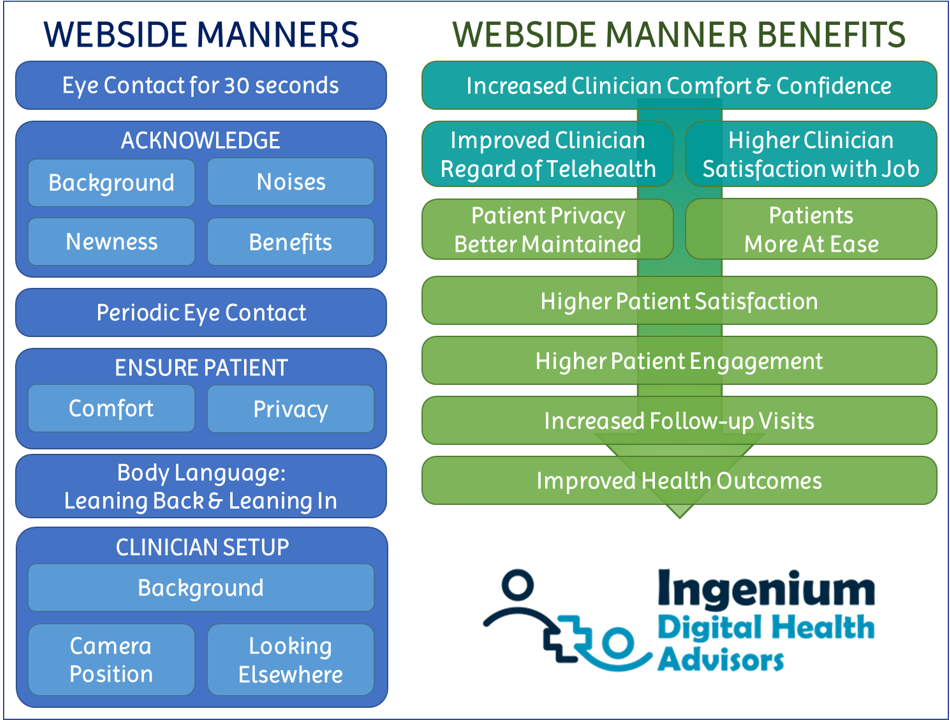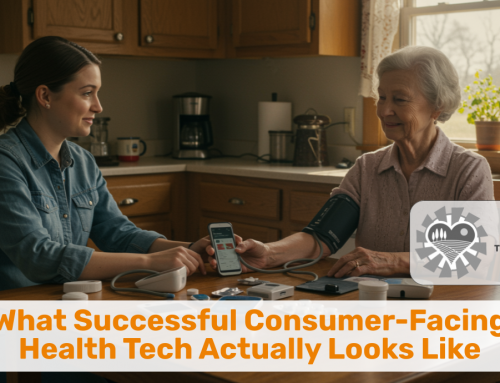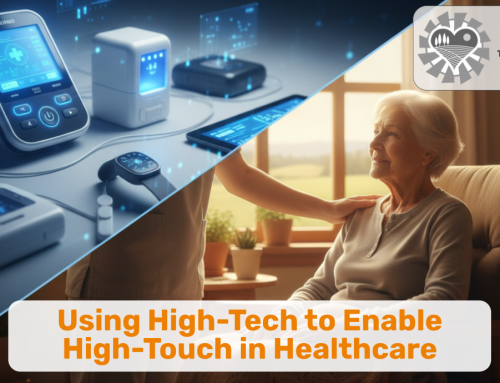The expression of “webside manners” is a play on word of combining web presence with bedside manners. In this third and final part we are concluding this series by describing the 10 benefits that derive from investing just a little bit of time to train clinicians on the best practices of conducting video telemedicine.
In the first two parts you can find the introduction and description of the first five webside manners and a description of seven additional webside manners.
Here are the 12 unique tips & tricks for excellent webside manners:
- Eye Contact for 30 seconds
- Acknowledge the Background
- Acknowledge Noises
- Acknowledge Newness
- Acknowledge Benefits
- Periodic Direct Eye Contact
- Ensure Patient Comfort
- Ensure Patient Privacy
- Body Language – Leaning Back and Leaning In
- Your Setup: Background
- Your Setup: Positioning the Camera
- Your Setup: Looking Somewhere Else
The Benefits of Excellent Webside Manners
Once clinicians are trained in and have mastered the webside manners, clinical practices can expect to see most if not all of these benefits in return:
1. Increased Clinician Comfort & Confidence
The increase in the confidence of clinicians that have been properly trained in webside manners is by far the greatest benefit that I have seen. By showing clinicians how to master the technical side and make sure they are “looking good”, the training puts the clinician back in control of the interaction with the patient.
A high degree of comfort and confidence is also the basis for at least half of the other benefits on this list.
2. Improved Clinician Regard of Telehealth
With an increased confidence of using telehealth comes a much more positive regard of telehealth and with that a higher likelihood of integrating this care delivery modality into the clinicians’ daily practice.
As I’ve written about a number of times, Telehealth is a clinical tool that should be wielded at the discretion of clinicians, who can only do so if they feel comfortable using it.
3. Higher Clinician Satisfaction with their job
The first correlation of a higher job satisfaction obviously stems from the first benefit, the increased level of confidence. Since telehealth can make up between 20-50% of a clinician’s practice, feeling confident about using telehealth is a key contributor to the satisfaction.
Before Covid-19 — before everyone had “embraced” telehealth — the smart, future-oriented clinicians looking for new jobs were explicitly seeking out opportunities that involved practicing telehealth or getting exposure to other digital health tools. Therefore, working at an organization that provides adequate support (such as the training in webside manners) contributes to a higher level of job satisfaction.
4. Patient Privacy Better Maintained
With the training of clinicians on the appropriate things to ask and look out for comes an increased protection of the patient’s privacy. As I laid out in part 2, clinicians can take a number of steps to ensure the patient’s privacy and to be on the lookout for when patient privacy is at risk.
5. Patients More At Ease
A more confident clinician who also has a number of suggestions on how to make the patient more comfortable will definitely put the patient more at ease, which paves the way for the next set of benefits of well-trained webside manners.
6. Higher Patient Satisfaction
When clinicians feel more comfortable in this “new environment” they can more effortlessly address the patients concerns or focus on the patient’s body language to notice important clues. Clinicians that are confident with the technology can also yield the various tools (screen sharing, white boards, sending files, sharing text) much more effortlessly making it a great experience for patients.
And when patients feel they’re understood and acknowledged, their level of satisfaction will increase.
7. Higher Patient Engagement
And with higher patient satisfaction comes a higher level of patient engagement. When clinicians are confident, then patients are more likely to trust the clinician and are also more likely to retain what clinicians suggested they do.
8. Increased Follow-Up Visits
While telehealth — due to its convenience and the elimination of travel — in itself contributes greatly to the increase in follow-up visits, when a clinician is confident, friendly and ensures a great experience for the patient, the likelihood of the patient scheduling a follow-up visit increases sharply.
9. Lower No-Show Rates
In some areas, traditional now show rates can be as high as in the low 20s (22%, 23%) and telehealth has repeatedly shown that, again largely due to the convenience of telehealth, it can help to lower no-show rates into the single digit realm (4%, 5%).
This, however, is also a function of the engagement of the clinician with the patient which is in turn proportional to the clinician’s camera presence.
10. Improved Health Outcomes
In the end, all of the preceding benefits of properly trained webside manners can lead to improved outcomes, especially when patient engagement increases and no show rates decrease.
And ultimately isn’t this what healthcare is all about?
On the Importance of Investing in Webside Manner Training



As this and the two previous articles outlined, investing into webside manner training is neither hard or rocket science, nor does it require a lot of time investment. All it takes is a simple 20-minute session to train clinicians on the 12 webside manners and pave the way to reaping the 10 benefits.
What webside manners do you think are most important? What other benefits have you seen as a result of well-trained clinicians?








To receive articles like these in your Inbox every week, you can subscribe to Christian’s Telehealth Tuesday Newsletter.
Christian Milaster and his team optimize Telehealth Services for health systems and physician practices. Christian is the Founder and President of Ingenium Digital Health Advisors where he and his expert consortium partner with healthcare leaders to enable the delivery of extraordinary care.
Contact Christian by phone or text at 657-464-3648, via email, or video chat.









Leave A Comment